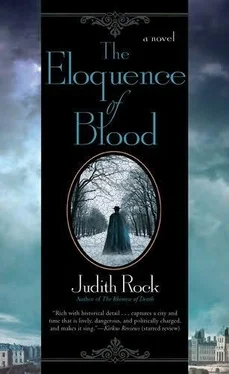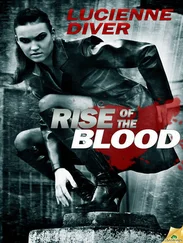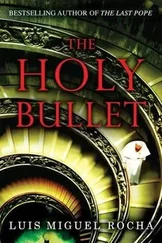Judith Rock - The Eloquence of Blood
Здесь есть возможность читать онлайн «Judith Rock - The Eloquence of Blood» весь текст электронной книги совершенно бесплатно (целиком полную версию без сокращений). В некоторых случаях можно слушать аудио, скачать через торрент в формате fb2 и присутствует краткое содержание. Жанр: Исторический детектив, на английском языке. Описание произведения, (предисловие) а так же отзывы посетителей доступны на портале библиотеки ЛибКат.
- Название:The Eloquence of Blood
- Автор:
- Жанр:
- Год:неизвестен
- ISBN:нет данных
- Рейтинг книги:5 / 5. Голосов: 1
-
Избранное:Добавить в избранное
- Отзывы:
-
Ваша оценка:
- 100
- 1
- 2
- 3
- 4
- 5
The Eloquence of Blood: краткое содержание, описание и аннотация
Предлагаем к чтению аннотацию, описание, краткое содержание или предисловие (зависит от того, что написал сам автор книги «The Eloquence of Blood»). Если вы не нашли необходимую информацию о книге — напишите в комментариях, мы постараемся отыскать её.
The Eloquence of Blood — читать онлайн бесплатно полную книгу (весь текст) целиком
Ниже представлен текст книги, разбитый по страницам. Система сохранения места последней прочитанной страницы, позволяет с удобством читать онлайн бесплатно книгу «The Eloquence of Blood», без необходимости каждый раз заново искать на чём Вы остановились. Поставьте закладку, и сможете в любой момент перейти на страницу, на которой закончили чтение.
Интервал:
Закладка:
With a bow to Charles, Morel moved toward the door also.
“Monsieur Morel,” Charles said, “before you go, please, how is it with Mademoiselle Brion and Monsieur Callot?”
Morel shook his head. “Nearly as bad as it could be. She can think of nothing but her brother. Monsieur Callot tried to see him, but Lieutenant-General La Reynie would not allow it. And he would not tell Monsieur Callot if he is going to charge Gilles with the murders. As for my own affairs, I fear more each day that Mademoiselle Brion will join the Ursulines. I must go back to them now. I try to keep them company in the evening.”
Charles wanted quiet for thinking. When Morel’s footsteps had faded on the stairs, he went out through the snow-covered courtyards, across the fathers’ garden, and into the main college library. Built only a few years ago, the library was one of the quietest places in the crowded school. He would have liked to settle on a bench under Louis le Grand’s ancient grapevine, said to be a relic from the Romans who had once settled St. Genevieve’s hill, calling it Lutetia. But the vine was only bare sticks now and the library was relatively warm. Inside, he went quickly up to the second floor and along a gallery to the little chamber called the cabinet of natural history.
He’d often found it deserted and a good place to think. Though small, it had two large windows to throw ample light on the treasures ranged along its shelves and in its cupboards. Charles wandered past heaps of sparkling pink and purple quartz, nuggets of gold, ancient gold and silver coins, bronze and gold brooches for fastening cloaks, huge outlandish seashells, a stone head of Julius Caesar with a badly chipped eye (discovered when the foundations for the college chapel were dug), shelves of brilliant butterflies on boards, a tiny pair of embroidered Chinese shoes, and a grayish, uninviting bezoar stone from a Near Eastern goat’s belly. There was also a waist-high globe, leather-surfaced and brightly painted, for those who wanted to see where all these things had come from.
Charles stopped at the end of the little room, in front of his favorite thing in the cabinet, and ran his fingers along it. The long, ornately twisted, ivory horn glimmered in a pool of sunlight. The fabulous unicorn’s horn, some insisted, though Charles thought it was more likely the horn from a great fish sailors claimed to see-and sometimes catch-far out of sight of land. In truth, he didn’t much care what it was; he loved it for its beauty. And for the way it drew to itself the human longing for miracles and wonders, for something good and beautiful beyond the everyday world. He rested his hand on the warmly glowing ivory, thinking unhappily about Marin.
The raving old man saw his lost Claire in every pretty, fairhaired girl. But some girls turned out to be demons, he’d said. They refused him alms, they laughed at him. Marin begged all over the quartier. What if he’d gone to the Mynette house for alms and Martine Mynette had been frightened by him, refused him, even tried to push him away? Marin had matter-of-factly told Charles that he’d tried to kill the Prince of Conde. And Charles had seen him strike down his would-be assassin outside the tavern. Even more disturbingly, Marin had suddenly taken to muttering about the Sacred Heart. Charles, like everyone else, heard it in capitals, Jesus’ Sacred Heart of growing popular devotion. But what if Marin didn’t mean it like that? What if he meant Martine Mynette’s little red enamel heart on its embroidered ribbon? Involuntarily, Charles shook his head. He didn’t want that to be true. But who else was there? So far, there was only the shadowy Tito, as hard to lay hands on as a unicorn. And there was Gilles Brion. Charles and Monsieur Fiennes could be wrong. Brion had had reason to kill both Martine and his father, better reasons, as sane men reckoned, than either of the others. But Charles simply could not imagine him doing it.
Loud whispers made Charles turn. A small boy, surely one of the college’s youngest students, had come in with his tutor. Perhaps nine or ten years old, dressed in brown velvet under his scholar’s gown, the boy stared wide-eyed around the cabinet.
“Where is it, maitre?” he whispered hoarsely to his tutor, who smiled at Charles and led the child to the shelf with the horn.
But the boy was too short to examine what was on the shelf. Charles brought a stool for the child to stand on from the end of another set of shelves, and the tutor thanked him and helped his charge up onto it.
“Oooh.”The boy touched the horn as though it might dissolve under his hand. “It really is here,” he breathed, turning shining eyes on his tutor and then on Charles. “There really are unicorns, then,” he said, with a great sigh of relief. “I was afraid there wouldn’t be. Not here.”
Charles left the two in possession of the cabinet. As he went out onto the gallery, he realized that he’d seen the child before, that he was the youngest of the three boys who’d gone to see if the holy water was frozen in the chapel on Christmas Eve. Smiling with pleasure at the boy’s delight in the horn, Charles walked under the grand painted ceiling of the ground floor, past the paintings of St. Ignatius and Francis Xavier, and out into the frozen garden. Under the winter sunset’s intense orange and red, he went slowly toward supper, thinking about the child’s easy trust that the horn was what he wanted it to be. Charles told himself that he could do that; he could simply keep on believing that Marin would not have killed Martine Mynette, no matter what, and keep his mouth shut. But Marin did not just look wistfully at every pretty girl, hoping that she was his beloved Claire. He saw hateful demons when he failed to find her. And I am not nine years old, Charles sighed to himself as the supper bell began to ring.
Charles, whose table assignments paralleled Pere Jouvancy’s, was once again eating his meals in the older pensionnaires’ refectory. The huge room was at least warmer with more students present, now that most classes had begun again. Charles took his place at the end of the faculty table on the dais, looking out over the vast room. Jouvancy sat a few places to his left, toward the center, and Pere Damiot was beside Charles. Supper was beans again, but at least there was mutton in the pottage. Even so, Damiot was eyeing his bowl with distaste.
“Salt it,” Charles recommended. “It’s not bad with more salt.”
“What’s that?” Damiot lifted up a whitish chunk of something on his spoon. “Blessed Virgin, is that a-a potato? Or whatever they’re called? Those things are cattle feed; surely we’re not that badly off yet!”
“Whatever possessed a gourmet like you to become a Jesuit? It’s not a potato, it’s mutton fat.” Charles passed Damiot the salt.
Outside the refectory windows, iron-grilled for protection against balls and flying shuttlecocks during courtyard recreation, dark had come. The refectory was lit with the bare minimum of tallow candles, and Charles supposed that Damiot could be forgiven for thinking that someone had put potatoes in the pottage. The feeble light picked out an occasional gleam of gold on the ceiling, but for once, the ceiling painted with the Virgin’s stars failed to comfort him. He kept imagining Marin helpless in the Chatelet, a useless beggar whom no one cared for, the perfect scapegoat. But if Marin had killed Martine Mynette, there had to be two murderers. There was no reason for him to have killed Henri Brion. At least, no reason Charles could think of.
“Maitre du Luc,” Damiot said loudly, “have you heard anything I’ve said?”
“What?”
“Do you want to know what I’ve learned about the smuggling scheme or not?”
“Certainly,” Charles said, pushing his fears away.
Читать дальшеИнтервал:
Закладка:
Похожие книги на «The Eloquence of Blood»
Представляем Вашему вниманию похожие книги на «The Eloquence of Blood» списком для выбора. Мы отобрали схожую по названию и смыслу литературу в надежде предоставить читателям больше вариантов отыскать новые, интересные, ещё непрочитанные произведения.
Обсуждение, отзывы о книге «The Eloquence of Blood» и просто собственные мнения читателей. Оставьте ваши комментарии, напишите, что Вы думаете о произведении, его смысле или главных героях. Укажите что конкретно понравилось, а что нет, и почему Вы так считаете.












